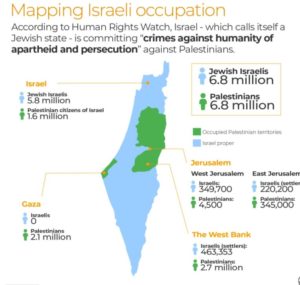Christian Zionism—what is it and why does it matter? By Cynthia Holder Rich
Part I of a Three-part series
PLEASE NOTE: THIS IS AN INTRODUCTORY ESSAY. If you are already well-acquainted with Christian Zionism, please pass this on to people who are not as well-versed as you, gentle reader. Thank you.
I grew up in a Christian family that saw the establishment of the State of Israel as a sign of God’s providence and activity in the world. Golda Meir, one of the first elected women leaders in the modern era, was a hero to my parents. My mother, a professional woman and the mother of three daughters, was well aware of the difficulty in finding voice and using one’s authority while female, and concerned for the future for her girls. Golda was well-spoken, highly-educated, fluent in English, a symbol of Jewish strength and resilience in the post WWII era—and a welcome sign of women’s capacity for leadership and new emerging opportunities. My parents had friends whose family members had been lost in the Holocaust. Zionism, the desire and work toward the establishment of a Jewish state that resulted in the establishment of Israel, seemed not only reasonable but good—something that people who believed in God should support.
I don’t remember hearing anything about Palestinians or Palestine when I was a girl. I didn’t know that there were Christians in Palestine—in truth, I didn’t know anything about the country or its people. People we knew traveled to the “Holy Land”—understood as Israel—and friends in high school and college went to Israel for a season or a year to live and work in a kibbutz, returning with excitement and pride about the future that was being built before their eyes in Israel.
I was a young pastor when what is now called “the first Intifada” began. After a lifetime of ignorance about what was happening and had happened in Israel and Palestine, I suddenly found myself pastoring people who had strong feelings, disagreements, and little clear information about events on the ground, historically or presently. I started up a steep learning curve—one I am still climbing.
This week on ecclesio, we delve into one subject impacting the lives of people in Israel and Palestine, one which is particularly relevant for those who strive to follow Jesus: Christian Zionism. As I have learned over the last four years, Christian Zionism—the work of Christians to ensure that Jews are in power in Israel and particularly in Jerusalem—is really strong in Africa. After moving to teach in Tanzania in 2017, I became sufficiently interested in and concerned about Christian Zionism here that I began talking to scholars about it—which resulted in a book that was published earlier this year on the subject. Part III of this week’s posts will explore Christian Zionism in Africa.
Christian Zionism as a movement is neither Christian nor Zionist. To follow Jesus—to be Christian—requires taking to heart his good news—that the poor are to be lifted up, that the weak are to be offered succor and help, and that the widow, the orphan, and the stranger in your land are to be cared for. There is a wide variety of Christian Zionist organizations, many of which were founded in and continue to be funded largely from the US. An analysis of these shows that none of them are guided by these principles.
Modern Zionism, the movement founded in the 19th century in Europe, had the goal of the establishment of a homeland for the Jewish people. Zionists continue to have this, with the building up and strengthening of the State of Israel, as their goals. Some, but not all, Zionists base their sense of ownership of the land of Israel on understandings of Biblical texts, particularly those from Genesis and Exodus, that suggest that God granted the Promised Land to the Israeli people—who, in this narrative, are the same people as the ancient Israelites. Many Zionists want to expand the territory held by Israel, and so support the building of more and more Jewish settlements in territory international organizations like the United Nations have designated for a future Palestinian state. The UN and many governments around the world see Israel’s settlement policy as a violation of international law.
Christian Zionists share SOME of the goals of Zionism. In particular, all Christian Zionist organizations are committed to Jews being in power in Israel—especially in Jerusalem. This is because Christian Zionists believe that Jesus will come again only when Jews are in power in Israel and are occupying Jerusalem.
But Christian Zionists differ from Zionists in one crucial way. Zionists believe in the need for a Jewish homeland—one that has been established in what is now Israel, which offers safety to the Jewish people. Centuries of anti-Semitism, which found its tragic and deadly peak to date in human history in the Holocaust during World War II, continue today in many places across the globe—including the US. Safety for a persecuted people is a foundational part of the Zionist narrative about the land.
The goal of Christian Zionism is to work toward and look for the Second Coming of Jesus. The belief that Jews must be in Jerusalem for the Second Coming to happen energizes support for the State of Israel and the tying of the State with ancient Israel and interpretations of Biblical prophecies concerning ancient Israel. These beliefs also state clearly that at the end, all who do not convert to Christianity will perish. When pressed, Christian Zionist leaders share their sense that most Jews will certainly have become Christian by then, but concede that those who do not accept Christ will die, along with all others who do not convert to Christianity. Jewish Zionists know this about Christian Zionists; so, while they accept gladly the help that Christian Zionists offer, a healthy wariness in the relationship is also present. In that Zionists are looking for safety for the Jews and Christian Zionists are looking for those same people to convert or die, it is clear that Christian Zionism and Zionism diverge on this central point.

The thin sliver of land on which Israel and the Palestinian territories sit was designated to Israel and the Palestinian Authority after World War II by the UN—which took this action, knowing that people would be displaced. What Palestinians call the Nakba, “catastrophe” in Arabic, gave land, homes, farms, public buildings, schools, hospitals, businesses, and all other structures from one people to another overnight, displacing over 700,000 people. From the standpoint of Christian theology, there is no way to justify this. The clear suffering and annihilation of the Jewish people in the Holocaust in no way offers ethical rationalization for the displacement, theft, violence, murder, rape and pillage that occurred to the people of Palestine. More than 70 years later, the wounds sustained in the Nakba have not healed. Instead, occupation, oppression, and injustice have caused deep levels of infection that continue to fester. The imbalance in power, military might, and profile in international forums between Israel and Palestine—nations which have about the same population but very different land and rights in the land on which they live—has only grown with time, and Israel continues to expand into land in the West Bank designated for the Palestinian people, which has been likened to a piece of Swiss cheese.

The land in which Israel and Palestine are located holds meaning for people of three ancient religions: Judaism, Christianity, and Islam. All three claim ownership of different pieces of this small piece of the globe, and all three take part in the oft-deadly conflicts there. Jesus’ disciples, people sent into all the world to teach the good news Jesus taught, descendants of those given the gift of speaking all the languages of the known world at Pentecost—these need to recognize that Christian theology does not support the naming of one place as holy nor particularly meaningful. The new Jerusalem spoken of in Revelation is not a city we can locate on a map. As the whole of God’s creation is sacred space, there is not one place that is more sacred than the rest. Those who follow Jesus are called to be about the promotion of peace in all the world—including in Israel and Palestine. Christian Zionist ideas and campaigns do harm to this goal, and are not the work to which Jesus’ disciples are called.
 Cynthia Holder Rich is the founding director of ecclesio.com, currently serving on the Faculty of Theology of Tumaini University Makumira, Arusha, Tanzania. She edited Christian Zionism in Africa (Fortress Academic, 2021) and co-chairs the Theology Working Group of the Presbyterian Church (USA)’s international, ecumenical initiative to confront Christian Zionism.
Cynthia Holder Rich is the founding director of ecclesio.com, currently serving on the Faculty of Theology of Tumaini University Makumira, Arusha, Tanzania. She edited Christian Zionism in Africa (Fortress Academic, 2021) and co-chairs the Theology Working Group of the Presbyterian Church (USA)’s international, ecumenical initiative to confront Christian Zionism.


Pingback: In This Time of Crisis, EPF PIN Calls for Action - PIN